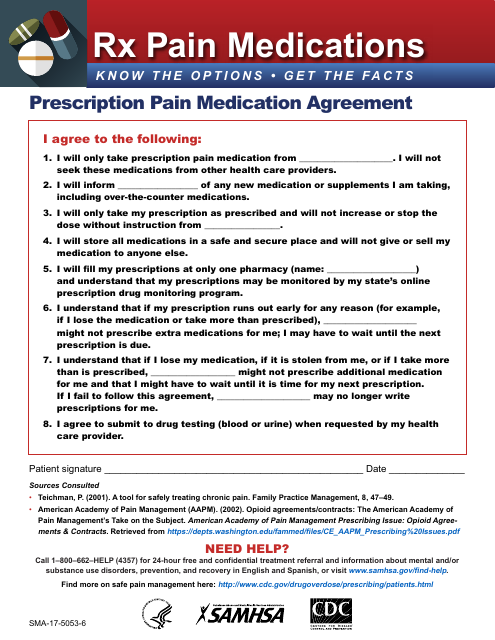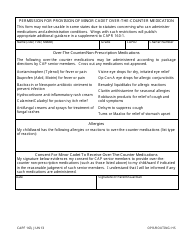Prescription Pain Medication Agreement - Rx Pain Medications
A Prescription Pain Medication Agreement, also known as an Opioid Treatment Agreement, is a contract between a doctor and a patient who is about to start long-term opioid therapy for chronic pain. This agreement is designed to clarify the rules and responsibilities of both the patient and the care provider.
The main aims of the agreement are to ensure the patient understands the potential risks and benefits of opioid therapy, to use the prescribed medication as directed, to not share the medication with others, and to maintain regular check-ins with the healthcare provider. Additionally, it outlines the conditions under which the medication may be discontinued. This agreement aims to prevent misuse and addiction, manage patient's pain effectively and improve patient safety.
The Prescription Pain Medication Agreement, often referred to as a Pain Treatment Agreement or Opioid Treatment Agreement, is typically filed by a healthcare provider such as a physician, nurse practitioner, or physician assistant. The agreement is made between the healthcare provider and the patient, where the patient agrees to certain terms and conditions of receiving opioid medication for managing chronic pain. Furthermore, this document is maintained in the patient's medical records. It's important to note regulations regarding this agreement can vary depending on the country or state.
FAQ
Q: What is a Prescription Pain Medication Agreement?
A: A Prescription Pain Medication Agreement is a contract between a doctor and patient regarding the use of prescription pain medication. It outlines the rules patients must agree to follow in order to use these potent, potentially dangerous medications in an attempt to reduce misuse and abuse of the drugs.
Q: Why is a Prescription Pain Medication Agreement necessary?
A: It is necessary as it helps in minimizing the risks associated with prescription pain medications, such as addiction and overdose, by ensuring that the patient understands their responsibilities.
Q: What information is typically included in this agreement?
A: This agreement often includes details like the medication being prescribed, dosage, restrictions on alcohol or other drug use, requirements for regular check-ins with the doctor, and consequences for violating the agreement.
Q: What happens if a patient violates a Prescription Pain Medication Agreement?
A: If a patient violates the agreement, it can result in the medication being discontinued, referral for substance abuse treatment, or even discharge from the doctor's care.
Q: Who signs the Prescription Pain Medication Agreement?
A: Both the doctor and the patient sign the agreement to ensure that both parties understand and adhere to the terms of the agreement.
Q: Can the terms of a Prescription Pain Medication Agreement vary?
A: Yes, the terms of a Prescription Pain Medication Agreement can vary depending on the patient's medical condition, prescribed medication, and the doctor's standards and policies.
Q: Is a Prescription Pain Medication Agreement legally binding?
A: While the agreement itself is not a legally binding contract, it can still have serious consequences including losing access to the medication or being dropped from the doctor's care if not followed.
Q: Can a patient refuse to sign a Prescription Pain Medication Agreement?
A: Yes, a patient can refuse to sign the agreement. However, refusal may limit their access to certain types of pain management treatment as doctors may be unwilling to prescribe certain medications without the agreement in place.




